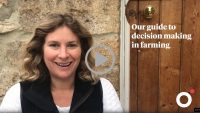Five Tips to Help You Make the Right Decision for Your Farming Business
The top 20% of successful farmers have one thing in common: The ability to make the right decision at the right time.
It might appear that the most successful businesses are more complex in nature, but it simply boils down to the skills involved with decision making. It can be easy to forget its importance as it’s something we all do every day, but making the correct decisions for a business can’t be undervalued and more emphasis needs to be placed on the value of this skill in farming businesses.
But it’s equally as important to acknowledge that faulty decision making can be more damaging to a farm business than faulty equipment, as a wrong decision can influence the success of a business for many years.
8th July 2020
-
Catherine Vickery See profile
Are you currently making any of these decisions?
- Do I invest and expand the business?
- Do I increase herd numbers?
- Should I buy that new piece of kit?
- Should I take on more labour?
- Should I take on more debt?
- Do I retire? Sell up?
- Do I formalise a Will/Partnership/Tenancy Agreement etc now?
Having the tools to come to the right decision at the right time can set a business up to flourish. Although it might feel an intangible process, there are some easy steps to break down decision making and make it more accessible.
Here are our five top tips to help you make the right decision for your farming business
1. Understanding the decision making process - why making a decision in agriculture is different to making a decision in any other industry
Corporate businesses identify the values they want to underpin for their business decisions and culture. Where this is working well you will see people ‘walk the talk’, making business decisions based on clearly identified values. Within farming businesses, we often don’t share our values, they remain assumed. For example, family, community, loyalty, independence, working outdoors and growing products that feed and clothe people. This can create serious problems and lasting resentment.
If our values and beliefs are challenged or questioned, we often feel uncomfortable and sometimes threatened. It can make us ‘switch off’ and not listen properly because we don’t want to hear what is being said. When questioning values and beliefs, it’s important to provide time to allow people to work through any differences.
It’s also important to appreciate that decision making for farmers is not just a conscious profit and loss evaluation. People farm for more than just money, they do it for social and environmental reasons or their embedded values. Everybody will have a different perspective on what they are seeking from being involved in the agricultural industry.
If you talk to a farmer about the value people seek from farming, most will think it’s an invaluable piece of machinery, with four wheels and available in many colours (but usually green).
Speak to an economist and value refers to the financial, social and environmental values. Few farmers are in agriculture for financial gain alone. While profitability is clearly an important element, and many advisers think it’s the primary motivation, other components like job satisfaction, family and environmental aspects will always play an important part in decision making.
Farmers will often accept poorer financial returns as a trade-off for some of these other perceived benefits. I’m sure some of these statements will resonate that reflect the utility of farming.
- ‘My role as a land manager is to hand my farm onto the next generation in a better condition than I inherited it – if I have to forego some profits to achieve this then so be it’
- ‘I love the aspect that all the family are involved at harvest – it’s great working together’
- ‘It’s a lot easier to be green when you are not in the red!’

2. Key characteristics of a good farm decision maker
In our experience, these are the attributes of the most successful farmers;
- When faced with a decision, a good decision maker identifies the critical variables (there are usually only two or three) and aren’t distracted by any non-critical ones. Experience, observation and a comprehensive ‘world view’ contribute to identifying the key items quickly
- Smart farmers listen to ‘experts’ but don’t follow them blindly because they know that experts only ever see part of the big picture
- Act quickly and decisively. More often than not, the good options disappear quickly
- It’s usually better to make a near-ideal decision than to analyse a situation to death and as a result miss an opportunity, that depended on getting the timing right. The principle of diminishing marginal response applies to analysis too
- Doing nothing is a decision and sometimes is the right one
- Be prepared. Don’t leave everything until the last minute
- Don’t beat yourself up for decisions that turn out to be less than ideal when viewed with the wisdom of hindsight.

3. The benefits of group/family meetings
Most businesses outside of agriculture use a regular formal meeting process to guide tactical and strategic decisions, yet less than one per cent of family farms, many of which regularly turn over millions of pounds, do the same. While many small farm businesses have regular discussions with a cropping adviser or a financial adviser such as an accountant, these meetings are often held separately and don’t involve all members of the family business.
Farm advisory boards enable all family members and advisers connected with a farm business to be at the table at the same time and allow decision-making and discussion to occur on a more formal and regular basis. Often meetings are only held in times of crisis such as an immediate succession issue that needs to be dealt with, a cashflow crisis, or at times when major investments are being considered (such as the purchase of land).
Board meetings provide a structured, disciplined platform to deal with the many production, financial and personal issues that need to be considered in running a farm business. They provide a regular opportunity for communication between all business partners and for the sharing of visions and goals, as well as planning for the future.
Successful boards use independent chairs with the skills to facilitate discussion in a way that includes all parties. It’s important that the usual leader of the family farm doesn’t take on the chairperson role. Establishing an independent chair enables family members to step back from running the meeting and think strategically about the business.
An effective chairperson has the following characteristics:
- high-level facilitation and interpersonal skills
- a good understanding of decision-making processes
- ability to recognise the influence of bias and prejudice
- possession of relevant business skills (for example, finance, crop production or human resource management)
- understanding of the personality types of all the people on the board and can identify and exploit each member’s strengths; and
- allows all members to have their say while moving the discussion towards a consensus.
A farm advisory board structure can be used to develop skills or employ those with the skills to use decision-support systems to assist analytical thinking.

4. You are not on your own - the benefits of utilising professional advisers
Farmers are increasingly using advisers with specialised knowledge to help inform their decisions. The main areas include:
- To bring technical expertise and the latest technologies to the business
- To improve efficiency, by allowing someone else do the ‘filtering’ of information
- As a sounding board to run through your ideas by bringing a range of experiences that could be applied to their situation
- When a more logical, rational analysis is required that the farmer is unable or unwilling to do
- For decisions that the individual finds particularly difficult because of the strong heart influence.
Listening to your advisers is a valid decision making strategy and can often lead to good decisions.

5. Making a ‘hard’ decision ‘easier’, what should you look for when making a decision
Many decisions in farming have flow on effects and the information we get only ‘starts the ball rolling’. There are many consequences that flow from considering a change and these have to be dealt with as well. This complexity makes it a hard decision.
For example, you are shown profit figures that suggest a mixed farming system is more profitable and resilient than cropping only. But to re-introduce sheep will require a decision on breed, consideration of infrastructure, where to get the finance to buy the sheep, possible new skills in feeding and grazing management, establishing new pastures and if there is enough personal interest to have livestock again. It’s a complex and hard decision.
- There is a serious potential loss if things go wrong
- The steps to get to a conclusion are long and difficult. In other words, it takes a lot of processing to come to a conclusion
- After processing, there appears to be no clear winner, no obvious superior decisions.
How to make a decision easier
- Talk about and calculate the size of the potential loss
- Consider strategies that may minimise the size of the potential loss
- Use tools such as a decision analysis matrix and making more robust decisions to provide structure to the decision-making process
- Endeavour to make clear distinctions between various options so the conclusions are clear and stand out.
Use the decision-making toolkit
Never more than now, you can utilise technology to help make a good, successful decision.
- Xero accounting and bookkeeping software
- Figured – Farm specific management tracking software
- Benchmarking
- Peer Groups

For more information, or if you have any questions about any of the above please contact Catherine Vickery.


